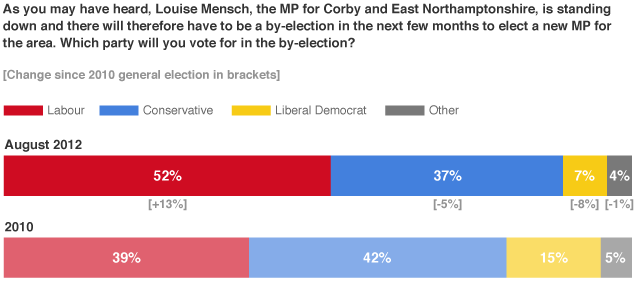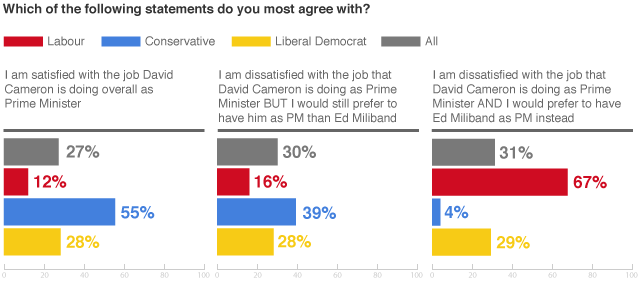
Labour are set for comfortable win in the Corby & East Northamptonshire by-election, according to a poll I conducted in the days following Louise Mensch’s resignation announcement. They begin the campaign with a 15-point lead: 52% to the Conservatives’ 37%.
Such a result would represent a 9-point swing to Labour swing since 2010, when the Tories regained the seat from Phil Hope. This is comparable to the national swing implied by recent published polls, which would be easily enough for a sizeable Labour majority if translated into votes at a general election.
The Conservative Party will no doubt put up a fight in Corby, but it will have its work cut out. The great majority of voters say they are fairly sure which party they will vote for in the by-election, and nearly three quarters – including two thirds of Tories – expect Labour to win.
Apart from this headline, which is perhaps not unexpected, the poll brings mixed news. On the one hand, the Tories will almost certainly lose a seat which we put considerable energy into winning only two years ago. As things stand, we could expect to lose many similar marginals where Labour are in second place. My battleground poll a year ago found the general position in these seats was rather worse than in the country as a whole (though prospects in constituencies we were defending against the Lib Dems were more encouraging). Voters are pessimistic about the economy, and are more likely to say the government is doing badly than that it is doing well; few think the Conservatives share their values, will do what they say, or are on the side of ordinary people.
On the other hand, it is perhaps surprising that the Labour lead is not even bigger in Corby, especially given the reason the by-election has come about. Some might, for example, have taken the view that Louise Mensch was abandoning them to their struggles in favour of a glamorous life in New York, but an overwhelming majority of voters for all three parties agreed that “she is perfectly entitled to put her desire for a better family life ahead of continuing as an MP” (although two thirds also thought she should have thought about these things before standing for parliament). Less than half took the opportunity to say that her struggle to balance work and family life were nothing compared to the everyday pressures they faced.
There are also some more encouraging points on from a national perspective. Though only just over a quarter (27%) said they were satisfied with the job David Cameron was doing overall, less than a third (31%) said they were dissatisfied and would prefer to have Ed Miliband as Prime Minister (indeed only 67% of those intending to vote Labour in Corby thought this). A clear majority thought the Conservatives were “willing to take tough decisions for the long term”. By two to one, people preferred the government’s argument on the debt and the deficit to the proposition that we should cut less fast and borrow more for longer (in fact even Labour voters were evenly divided on the question). Only one third of voters trusted Miliband and Ed Balls to manage the economy more than they trusted Cameron, Nick Clegg and George Osborne.
Making tough decisions for the good of the country will clearly be the basis of the Conservative pitch to the voters at the next election. Unfortunately, it looks as though we will soon have one fewer MP to help make the case.




